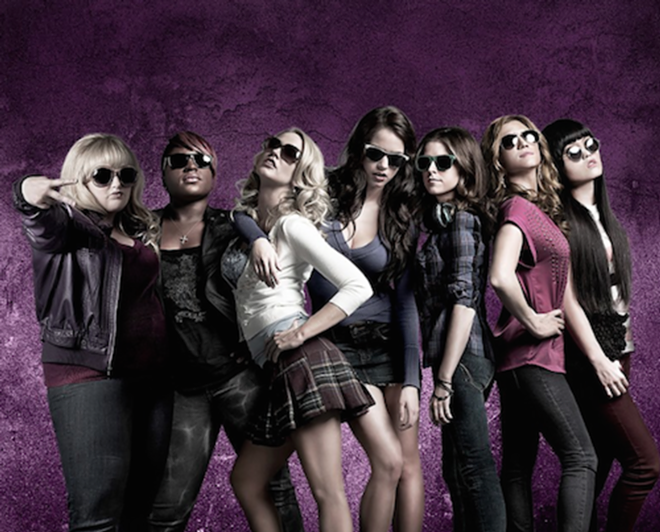Despite the small-screen popularity of Glee (at least the first couple of years), the success of Pitch Perfect in 2012 seemed like somewhat of an anomaly. A movie about an all-girl a capella singing group – who’d have thunk it? But Anna Kendrick’s star was on the rise (ever since playing George Clooney’s brittle assistant in Up in the Air three years before) and her single from the film, “Cups,” became a big hit on the radio. On top of that, co-star Rebel Wilson was riding the “women-of-a-certain-size-who-are funny” wave championed by Melissa MCarthy, and it appeared that the stars were in alignment to make a sequel all but inevitable.
Here it is, three years later, and hopes are running high that the child will outshine the parent (the first one grossed about $65 million in North America alone), especially since the studio saw fit to release it in the heat of the summer, surrounded by action movies rather than, like the last one, in the more Oscar-friendly atmosphere of October. Sophomore slump be damned, this one was groomed to be an audience-friendly box office champion. And there is no doubt it will succeed – just don’t look for anything new, or terribly subtle, to be brought to the proceedings.
This second chapter of the Barden Bellas takes place three years after the first, and most of them are set to graduate and begin a new chapter of their lives. A disastrous performance (nicknamed “Muffgate” by the press – don’t ask) in front of President Obama puts them on the road to some serious redemption, culminating in a performance at the world a capella competition that no American group has ever won. Along the way, Kendrick’s Beca has to find her own musical voice and Wilson’s Fat Amy comes to the realization that she really loves her hookup partner.
And therein lies the biggest problem with PP2 – the plot, such as it is, is simply a series of predictable or irrelevant set pieces that do nothing more than take us from point A to point B by way of point C. For instance, a scene in a rich man’s basement where various groups compete for a gift card (I kid you not) is an obvious homage to a similar and much more believable scene in the previous film. This one goes on way too long, serves no purpose other than to show the groups performing, and is almost comically unrealistic (the host even has an electronic scoreboard that announces categories of music). There is another long segment where the girls attend a camp to re-bond, even though bonding never seemed to be the problem in the first place.
I could go on and on – but the point is that after a while, I stopped caring about all the filler and began to look forward to the next musical number. And that is where PP2 really excels. Boasting more numbers than the original installment, each choreographed piece is a joy to behold – so much so that I found myself feeling guilty that I enjoyed Das Sound Machine, the obvious villains in the story, as much as I did (they reminded me a little of Mike Myer’s old skits on SNL where he did Dieter – “And now it is time to dance” – but still…). And Jessie J’s “Flashlight,” performed by the Bellas at the competition, is a gorgeous number that has a real shot at getting nominated for an Oscar next year.
Kendrick, as always, is infinitely watchable – if she is the next generation of Hollywood stars, then I’m all for it. And Wilson continues to take the negative connotation of “fat” and make it her own without allowing it to be the sole source of the punchline. She also has most of the best lines, though a lot of what passes for humor in the screenplay is mainly of the bathroom variety – “I’ve done something terrible! And I’m not talking about crop-dusting Beca and Chloe right now!” is one example (giving characters the last names of Junk and Hardon are another). Likewise, some of the members of the group are gross stereotypes – the Asian, the Latina, the African-American – and not perhaps the best example of racial diversity in film. The male characters are mostly window dressing – though Ben Platt is very sweet as the potential love interest of the Bellas' newest member (Hailee Steinfeld), and John Michael Higgins, as the co-announcer at the competitions, has some (possibly improvised) lines that are almost too ridiculously sexist to print here. Thankfully, Director Elizabeth Banks (who appears as the other announcer) seems to know her way around a movie camera, and keeps things interesting and fast-paced enough that the shortcomings almost don’t matter – almost being the key phrase here.
The film is certainly fun. But “fun” can be like “nice,” a word that damns with faint praise. The movie is certainly “fun” enough to not suffer the sophomore slump at the box office… but it sure would have been “nice” if it had been a better movie.


